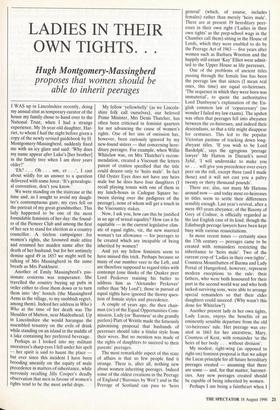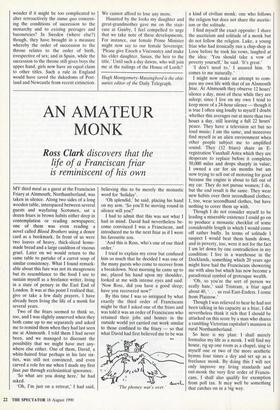LADIES IN THEIR OWN TIGHTS. . .
Hugh Montgomery-Massingberd proposes that women should be able to inherit peerages
I WAS up in Lincolnshire recently, doing my annual stint as temporary curator of the house my family chose to hand over to the National Trust, when I had a strange experience. My 16-year-old daughter, Har- riet, to whom I had the night before given a copy of the newly revised guidebook by H. Montgomery-Massingberd, suddenly fixed me with an icy glare and said: 'Why does my name appear after Luke's [her brother] in the family tree when I am three years older?'
'Eh? . . . Oh . . . urn, er. . . I cast about wildly for an answer to a question delivered with some force. 'It's genealogic- al convention, don't you know.'
We were standing on the staircase at the time and, as I sought to avoid my daugh- ter's contemptuous gaze, my eyes fell on the portrait of my great-grandmother. This lady happened to be one of the most formidable feminists of her day: the found- er of the Pioneer Club and among the first of her sex to stand for election as a country councillor. A tireless campaigner for women's rights, she favoured male attire and resumed her maiden name after the death of her husband; but for her untimely demise aged 49 in 1857 we might well be talking of Mrs Massingberd in the same breath as Mrs Pankhurst.
Another of Emily Massingberd's pas- sionate concerns was temperance. She travelled the country buying up pubs in order either to close them down or to turn them into 'dry' hostels (the Massingberd Arms in the village, to my snobbish regret, among them). Indeed her address in Who's Who at the time of her death was The Shoulder of Mutton, near Maidenhead. Up in Lincolnshire she would harangue the assembled tenantry on the evils of drink while standing on an island in the middle of a lake containing her preferred beverage.
Perhaps as I looked into my militant ancestress's sharp eyes I fell under her spell — her spirit is said to haunt the place — but ever since this incident I have been brooding uneasily on the equity of male precedence in matters of inheritance, while nervously recalling Jilly Cooper's deadly observation that men in favour of women's rights tend to be the most awful drips. My fellow 'yellowbelly' (as we Lincoln- shire folk call ourselves), our beloved Prime Minister, Mrs Denis Thatcher, has often been criticised in feminist quarters for not advancing the cause of women's rights. One of her sins of omission has, however, been curiously ignored by my new-found sisters — that concerning here- ditary peerages. For example, when Willie Whitelaw was, on Mrs Thatcher's recom- mendation, created a Viscount the letters patent of cration specified that the title could descen only to 'heirs male'. In fact Old Oyster Eyes does not have any heirs male but he does have four daughters (I recall playing tennis with one of them in
my lunch-hours in Cadogan Square be- tween slaving over the pedigrees of the peerage), none of whom will get a touch in the Viscountcy stakes.
Now, I ask you, how can this be justified in an age of sexual equality? How can it be
equitable — in the current legislative clim- ate of equal rights, viz, the new married woman's tax allowance — for peerages to be created which are incapable of being inherited by women?
And yet my fellow feminists seem to have missed this trick. Perhaps because so
many of our number veer to the Left, and
are therefore supposed to regard titles with contempt (one thinks of the Quaker peer Lord Peckover training his butler to address him as 'Alexander Peckover' rather than 'My Lord'), those in pursuit of equal rights have ignored the thorny ques- tion of female styles and precedence.
A couple of years ago, the then chair- man (sic) of the Equal Opportunities Com-
mission, Lady (or 'Baroness' as she grandly prefers) Platt of Writtle made the fatuously patronising proposal that husbands of peeresses should take a titular style from their wives. But no mention was made of the rights of daughters to succeed to their parents' peerages.
The most remarkable aspect of this state of affairs is that so few people find it strange. There is, after all, nothing new about women inheriting peerages. Indeed some of the oldest creations in the Peerage of England ('Baronies by Writ') and in the Peerage of Scotland can pass to 'heirs general' (which, of course, includes females) rather than merely 'heirs male'.
There are at present 19 hereditary peer- esses in their own right ('Ladies in their own tights' as the prep-school wags in the Chamber call them) sitting in the House of Lords, which they were enabled to do by the Peerage Act of 1963 — five years after women such as Barbara Wootton and the happily still extant 'Kay' Elliot were admit- ted to the Upper House as life peeresses.
One of the problems of ancient titles passing through the female line has been the peerage law that sisters (I mean real ones, this time) are equal co-heiresses. 'The sequence in which they were born was immaterial', to quote the authoritative Lord Dunboyne's explanation of the En- glish common law of 'coparcenary' (no wonder I failed my law exams). The upshot was often that peerages fell into abeyance between the co-heiresses, and indeed their descendants, so that a title might disappear for centuries. This led to the popular Victorian pastime of tracking down long- abeyant titles. 'If you wish to be Lord Bardolph', says the egregious 'peerage lawyer' Mr Hatton in Disraeli's novel Sybil, 'I will understake to make you so . . . will give you precedence over every peer on the roll, except three (and I made those) and it will not cost you a paltry twenty or thirty thousand pounds'.
There are, alas, not many Mr Hattons around now — and today most co-heiresses to titles seem to settle their differences sensibly enough. Last year's revival, after a mere 493 years abeyance, of the Barony of Grey of Codnor, is officially regarded as the last English case of its kind, though the Edinburgh peerage lawyers have been kept busy with various resuscitations.
In more recent times — certainly since the 17th century — peerages came to be created with remainders restricting the inheritance to 'heirs male'. Two of the current crop of 'Ladies in their own tights', Countess Mountbatten of Burma and Lady Portal of Hungerford, however, represent modern exceptions to the rule: their fathers, who were both honoured for their part in the second world war and who both lacked surviving sons, were able to arrange special remainders so that their elder daughters could succeed. (Why wasn't this done for Whitelaw?) Another present lady in her own tights, Lady Lucas, enjoys the benefits of an eminently sensible departure from the old 'co-heiresses' rule. Her peerage was cre- ated in 1663 for her ancestress, Mary, Countess of Kent, with remainder `to the heirs of her body . . . without division'.
My modest, right-wing (as opposed to right-On) feminist proposal is that we adopt the Lucas principle for all future hereditary peerages created — assuming that there are some — and, for that matter, baronet- cies. Any new peerages created should be capable of being inherited by women.
Perhaps I am being a faintheart when I
wonder if it might be too complicated to alter retroactively the status quo concern- ing the conditions of succession to the monarchy and to existing peerages and baronetcies? In Sweden (where else?) though, they have brought in a measure whereby the order of succession to the throne relates to the order of birth, irrespective of sex; and in Spain, while the succession to the throne still gives boys the upper hand, girls now have an equal claim to other titles. Such a rule in England would have saved the dukedoms of Port- land and Newcastle from recent extinction.
We cannot afford to lose any more.
Haunted by the looks my daughter and great-grandmother gave me on the stair- case at Gunby, I feel compelled to urge that we take note of these developments. For instance, our female Prime Minister might now say to our female Sovereign: Please give Enoch a Viscountcy and make his elder daughter, Susan, the heir to the title.' Until such a day dawns, who will join me at the railings of the House of Lords?
Hugh Montgomery-Massingberd is the obit- uaries editor of the Daily Telegraph.



























































 Previous page
Previous page